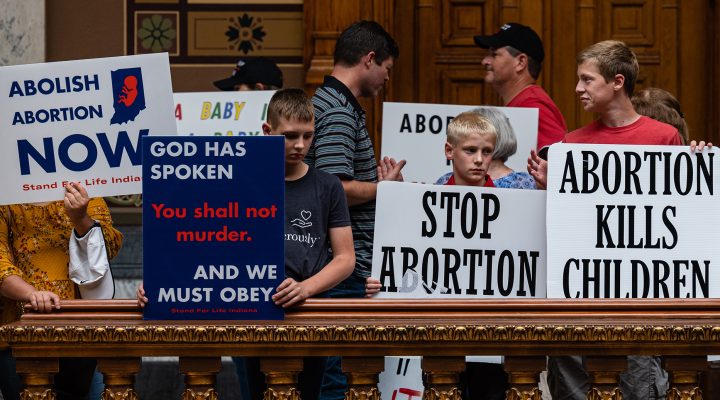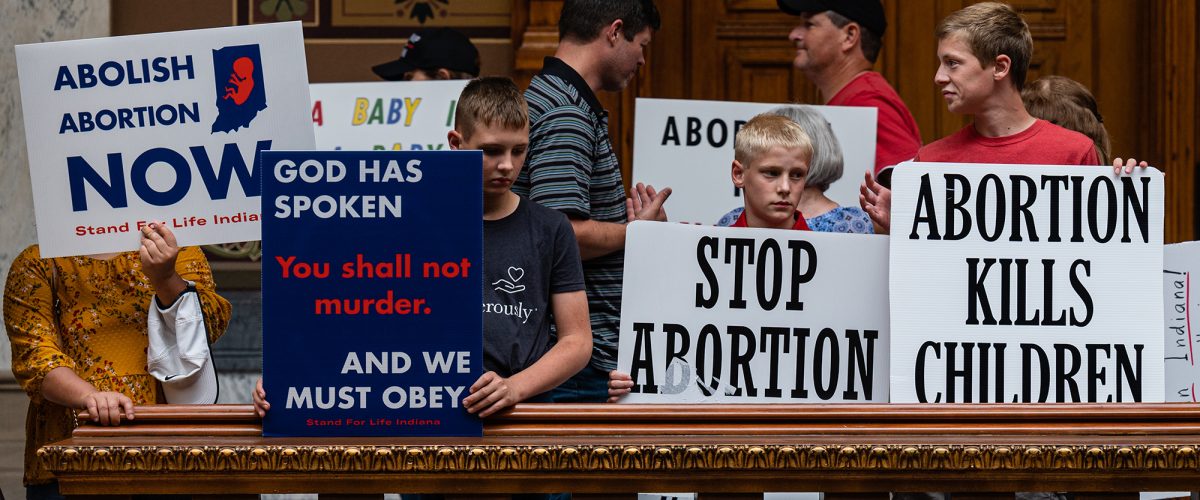Religion won on the opposite side of an abortion case than usual April 4, part of a trend of those who favor access to abortion declaring they have a religious right to the procedure.
That counters the more common narrative of evangelical Christians and Roman Catholics that “life begins at conception” and therefore all abortion should be outlawed.
The fact that this declaration of when life begins is a religious sentiment more than a scientific fact is the key idea in a lawsuit brought against the state of Indiana’s near-total ban on abortion in August 2022. Indiana was the first state to pass such a strict anti-abortion law in light of the U.S. Supreme Court overturning Roe v. Wade.
One month after the Indiana law was adopted, the ACLU of Indiana filed a lawsuit challenging the ban on behalf of five anonymous Jewish, Muslim and spiritual plaintiffs and the group Hoosier Jews for Choice. These plaintiffs said their religious beliefs support — and mandate in certain circumstances — abortions. Thus, they said the abortion ban violates Indiana’s Religious Freedom Restoration Act.
That’s an ironic twist because states like Indiana lately have adopted RFRA bills most often in an attempt to codify the rights of evangelical Christians they believe are under assault by secular culture. State RFRA laws — often modeled on the Clinton-era national law — have been hotly contested in states like Iowa this year.
In December 2022, an Indiana state trial court granted the plaintiffs a preliminary injunction, prohibiting enforcement of the abortion ban on them while the litigation continues. The state appealed this injunction to the Indiana Court of Appeals. Then on March 1, 2023, Americans United for Separation of Church and State filed an amicus brief joined by 14 religious and civil rights organizations to argue the injunction should remain in place.
The April 4 ruling from the Indiana Court of Appeals was in response to that series of events and for now applies only to the plaintiffs.
Judge L. Mark Bailey, presiding judge of the first district Court of Appeals of Indiana, wrote: “Where theologians cannot agree, legislators are ill-equipped to define when life begins.”
“Where theologians cannot agree, legislators are ill-equipped to define when life begins.”
He added: “Legislators, an overwhelming majority of whom have not experienced childbirth, nevertheless dictate that virtually all pregnancies in this state must proceed to birth notwithstanding the onerous burden upon women and girls. They have done so not based upon science or viability but upon a blanket assertion that they are the protectors of ‘life’ from the moment of conception. In my view, this is an adoption of a religious viewpoint held by some, but certainly not all, Hoosiers. The least that can be expected is that the remaining Hoosiers of child bearing ability will be given the opportunity to act in accordance with their own consciences and religious creeds.”
While the ruling no doubt will be appealed to the Indiana Supreme Court, the state appeals court’s logic represents a new front in the abortion wars that are motivating political action from the center and left as much as from the right now.
This ruling does not settle the matter of abortion access in Indiana. It allows to stand a current injunction against enforcing the ban on most abortions while sending part of the case back to a lower court.
But for now, abortion rights groups are celebrating a rare victory in the post-Roe world.

Rachel Laser
“The court rightly found that Indiana’s abortion ban cannot override religious freedom protections in Indiana law,” said Rachel Laser, president of Americans United for Separation of Church and State. “As we told the court, abortion bans undermine religious freedom by imposing one religious viewpoint on all of us. Abortion bans are a direct attack on the separation of church and state.
“If America is to make good on its promise of religious freedom, each of us must be free to make our own decisions about our own bodies based on our own beliefs. That’s why we need a national recommitment to the separation of church and state. It’s the shield that protects freedom without favor and equality without exception for all of us.”
Ken Falk, legal director for ACLU of Indiana, lauded the ruling: “For many Hoosiers, the ability to obtain an abortion is necessary based on a sincerely held religious belief. The burden placed on these individuals by Indiana’s abortion ban is absolute and life-altering. The Religious Freedom Restoration Act is clear that it protects religious freedom for all Hoosiers, and the court of appeals’ decision today reflects that clear directive.”
Others were not celebrating.
A statement from Indiana’s attorney general said: “Life is still winning here in Indiana. Today’s ruling on the injunction only affects the four individuals and the single organization named in the lawsuit. But the ACLU is right about one thing — this case is far from over, and Hoosiers know our office will always fight to protect the unborn.”
Indiana Right to Life President Mike Fichter declared: “Today’s court ruling is wrongly decided. The Indiana Supreme Court has already ruled the state has a compelling interest in protecting unborn life, and Indiana’s new abortion restriction law is doing that by reducing Indiana abortions to the lowest level in five decades. We are confident Indiana will prevail against any claims that abortion — the intentional ending of an innocent and helpless human life — is a religious freedom.”


